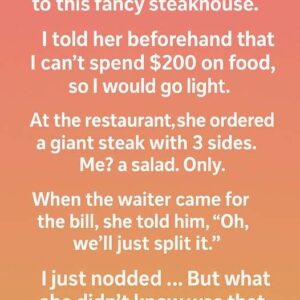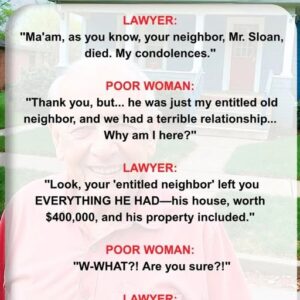At eighteen, I thought I understood fairness. I thought adulthood arrived in neat, predictable steps: you graduate, you work, you contribute, you grow up. So when my mother told me I’d have to start paying rent, I didn’t argue. I didn’t push back. I nodded, swallowed the knot in my throat, and accepted what I believed was simply my first real step into independence.
It was hard. Harder than I let anyone see.
I worked after school most days, sometimes until midnight. Weekends weren’t for hanging out with friends but for picking up extra shifts wherever I could. While other teenagers tossed their paychecks toward clothes, dates, and concerts, I tucked mine into envelopes labeled rent, gas, and school lunches. Every dollar mattered. Every decision required calculation.
But I believed she was preparing me. Teaching me. Guiding me toward responsibility the way good parents do. And even though it stung some days, I was proud—proud to stand on my own feet, proud to help, proud to become the adult she insisted I could be.
When I finally moved out, it felt like stepping into sunlight after years of learning to walk in dim rooms. I carried with me the lessons she had taught—structure, discipline, responsibility. I didn’t resent her. If anything, I believed I owed her gratitude.
Life moved on. Jobs came. Promotions followed. My younger brother stayed home longer than I did—much longer. I never questioned it. I assumed he was paying his part too, learning the same lessons I had.
And then, years later, everything changed with a single casual comment.
My mother called one morning, her voice trembling in that way people get when they don’t want to reveal how scared they really are. Money was tight. Her health wasn’t what it used to be. Her apartment building had raised the rent again. She needed help. She wanted to know if she could stay with me for a while—“just until I get things sorted,” she said, though we both knew there was no sorting left to do.
The answer came easily.
Of course she could move in.
Of course I would help her.
This was the woman who raised me, who sacrificed for me, who taught me to survive.
I didn’t hesitate.
We began planning the logistics—what room she’d use, how we’d arrange the furniture, what I needed to prepare. I felt strangely hopeful. Maybe this was an opportunity—for closeness, for healing, for understanding each other as adults rather than mother and child.
Then my brother called.
He was dropping off some old boxes for Mom and mentioned—almost jokingly—how lucky he had been to live rent-free all those years.
“What?” I asked, thinking I’d misheard him.
“Oh yeah,” he laughed. “Mom never charged me a dime. She said she didn’t believe in that anymore. Remember how you always said you paid rent? Couldn’t be me. She said I needed to focus on school.”
The air left my lungs in a slow, stunned exhale.
He’d lived there years longer than I had. Years. And not once had she asked him for a single dollar. Not once had she told him he needed to contribute. Not once had she taught him the lesson she insisted on teaching me.
I hung up the phone politely, but the moment I did, something inside me cracked—not in anger, but in confusion so deep it felt like betrayal.
Why me?
Why only me?
Was I the oldest, so she expected more from me?
Or had she needed me more than she let on?
Why had she never explained the difference?
The questions swirled until they blurred. By the time I went to bed, my childhood felt like a puzzle with missing pieces.
The next morning, Mom was set to arrive.
And I knew I couldn’t let her move into my home with those questions lodged like stones in my chest.
I needed the truth.
When she stepped through the door, carrying a tired smile and a small suitcase that seemed far too light for a life uprooted, I felt a wave of tenderness. She looked smaller than I remembered. Older. Vulnerable in a way mothers rarely appear to their children.
We sat at the kitchen table, two mugs of tea between us. The steam curled upward like a signal of peace, though my heart was anything but peaceful.
“Mom,” I began, gently, “I want to ask you something. Not to accuse or reopen old wounds. Just… to understand.”
Her brows furrowed with concern. “What is it?”
“Why did I have to pay rent at eighteen,” I asked softly, “and my brother never did?”
She blinked, startled. For a moment, she looked younger—like the mother I remembered when I was ten and she realized she’d forgotten to sign a permission slip. Guilty. Sad. Unprepared.
Then she sighed.
Long, slow, honest.
“I was struggling,” she said quietly. “Really struggling. More than you knew. Your rent wasn’t about teaching you responsibility.” She paused, eyes glistening. “It was survival.”
I felt something inside me unclench, just enough to breathe.
She went on.
“Your father had just stopped helping financially. My hours at the hospital were cut. The bills kept coming. The only steady thing in my life then was your check on the first of the month. I didn’t want to ask, but I didn’t see another way.”
I sat there, stunned—not by the confession, but by how long she’d carried that alone.
“And your brother…” she continued, shaking her head, “By the time he turned eighteen, things were different. I had a better job. The debts were paid off. I could breathe again. I didn’t want him to feel the way you must have felt. I didn’t want either of you to think your worth depended on your wallet.”
Her voice cracked on the last sentence.
Suddenly, every resentment dissolved into dust.
She hadn’t favored him.
She hadn’t punished me.
She’d simply been doing her best with the resources she had, at the time she had them.
Life hadn’t treated us equally, so she hadn’t always been able to treat us equally either.
It wasn’t unfairness—it was survival.
The truth settled over me like warm sunlight breaking through storm clouds.
And in that moment, the adult in me finally saw the human in her.
When she officially moved in days later, something between us had shifted. The tension was gone, replaced by understanding so gentle it felt like forgiveness.
The first night, we ate dinner together—simple roasted chicken and vegetables. She insisted on washing the dishes. I insisted on helping. We laughed at each other’s stubbornness. It felt… easy. Like we were rewriting old chapters with better ink.
As weeks passed, we settled into a rhythm—two adults learning each other anew. She folded laundry with the same careful touch she used on my clothes decades ago. I drove her to doctor appointments, just as she once drove me to school.
But something else, something deeper, grew between us:
Conversation.
Honest conversation.
Adult conversation.
Human conversation.
We talked about things we’d never discussed before:
Her fears.
My disappointments.
Her regrets.
My struggles.
Her hopes.
My future.
One night she said quietly, “I wish I had explained things better back then.”
I reached across the couch, took her hand, and squeezed gently.
“You did the best you could,” I said. “And now I finally understand.”
Her eyes softened with gratitude.
Because the truth is this:
We carry so many assumptions from childhood.
Assumptions that turn into beliefs.
Beliefs that turn into wounds.
Wounds that fester when left unspoken.
But sometimes, a simple conversation can heal years of confusion.
My mother wasn’t perfect.
She wasn’t always fair.
She wasn’t always transparent.
But she was trying.
She was surviving.
She was loving us in the ways she could.
And now, after everything, I offer her a home not out of obligation or guilt, but out of compassion.
Out of clarity.
Out of forgiveness.
Out of love.
Families aren’t strengthened by perfect choices.
They’re strengthened by truth.
By vulnerability.
By the courage to rewrite what was broken.
And sometimes, all it takes to heal the past…
is finally being ready to understand it.





